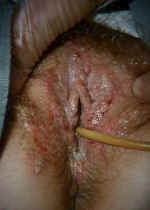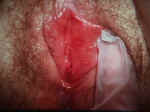|
|
Operational Obstetrics & Gynecology
Herpes Vulvitis
A tingling or itching sensation precedes the development of painful blisters on both sides of the vulva in acute herpes infection. The blisters then break open, releasing clear fluid, and form shallow ulcers, filled with grayish material. The ulcers then crust over and when the crusts fall off, the underlying skin looks normal. The process takes 7-10 days.
 During the ulcerative stage, the pain may be so intense as to require narcotic
analgesia. Urinating during this time can be extremely painful due to the hot, salty urine
coming in contact with the open sores on the vulva. The pain may be so intense as to
require such measures as urinating into a sitz bath or even placement of an indwelling
urinary catheter (Foley).
During the ulcerative stage, the pain may be so intense as to require narcotic
analgesia. Urinating during this time can be extremely painful due to the hot, salty urine
coming in contact with the open sores on the vulva. The pain may be so intense as to
require such measures as urinating into a sitz bath or even placement of an indwelling
urinary catheter (Foley).
The diagnosis is made by the typical appearance and may be confirmed with a herpes culture.
Although this lesion resolves spontaneously, re-occurrences are common.
Preferred treatment (CDC) for an initial outbreak is:
- Acyclovir 400 mg orally three times a day for 7-10 days, OR
- Acyclovir 200 mg orally five times a day for 7-10 days, OR
- Famciclovir 250 mg orally three times a day for 7-10 days, OR
- Valacyclovir 1 g orally twice a day for 7-10 days.
 Preferred treatment (CDC) for a recurrence is:
Preferred treatment (CDC) for a recurrence is:
- Acyclovir 400 mg orally three times a day for 5 days, OR
- Acyclovir 200 mg orally five times a day for 5 days, OR
- Acyclovir 800 mg orally twice a day for 5 days, OR
- Famciclovir 125 mg orally twice a day for 5 days, OR
- Valacyclovir 500 mg orally twice a day for 5 days.
Some individuals have frequent recurrences, as often as every several weeks. For these women, "suppressive therapy" can be very helpful. Suppressive therapy involves taking relatively low doses of anti-viral medication daily, in order to keep the virus from causing such frequent attacks. Suggested regimens (CDC) for suppressive therapy include:
- Acyclovir 400 mg orally twice a day, OR
- Famciclovir 250 mg orally twice a day, OR
- Valacyclovir 250 mg orally twice a day, OR
- Valacyclovir 500 mg orally once a day, OR
- Valacyclovir 1,000 mg orally once a day.
Another component of a herpes outbreak can be a bacterial superinfection. During the ulcerative stage, skin bacteria (strep, staph, coliforms) can attack the exposed ulcers, causing a bacterial infection of the ulcer. This is particularly true of large or multiple, confluent ulcers. These women may benefit (faster recovery and less pain) by the use of antibiotics such as amoxicillin, any cephalosporin or erythromycin, even though those drugs will have no effect on the course of the viral component of the herpes.
Home · Introduction · Medical Support of Women in Field Environments · The Prisoner of War Experience · Routine Care · Pap Smears · Human Papilloma Virus · Contraception · Birth Control Pills · Vulvar Disease · Vaginal Discharge · Abnormal Bleeding · Menstrual Problems · Abdominal Pain · Urination Problems · Menopause · Breast Problems · Sexual Assault · Normal Pregnancy · Abnormal Pregnancy · Normal Labor and Delivery · Problems During Labor and Delivery · Care of the Newborn
|
Bureau of Medicine
and Surgery |
Operational
Obstetrics & Gynecology - 2nd Edition |
This web version of Operational Obstetrics & Gynecology is provided by The Brookside Associates Medical Education Division. It contains original contents from the official US Navy NAVMEDPUB 6300-2C, but has been reformatted for web access and includes advertising and links that were not present in the original version. This web version has not been approved by the Department of the Navy or the Department of Defense. The presence of any advertising on these pages does not constitute an endorsement of that product or service by either the Department of Defense or the Brookside Associates. The Brookside Associates is a private organization, not affiliated with the United States Department of Defense. All material in this version is unclassified.
This formatting © 2006
Medical Education Division,
Brookside Associates, Ltd.
All rights reserved